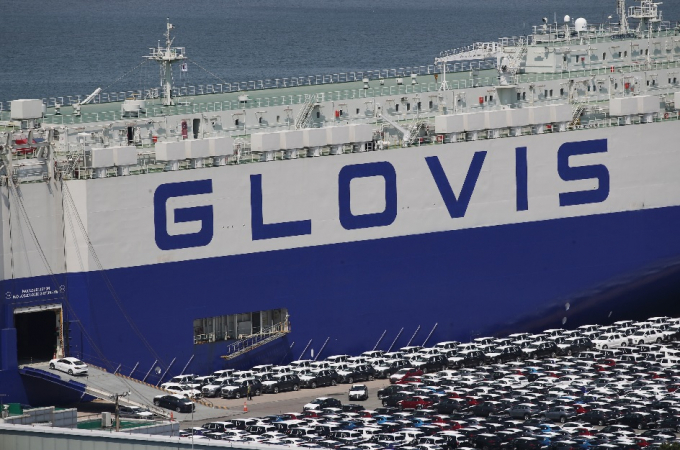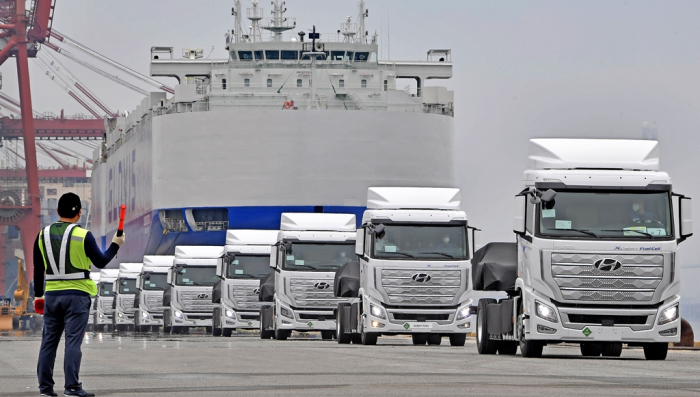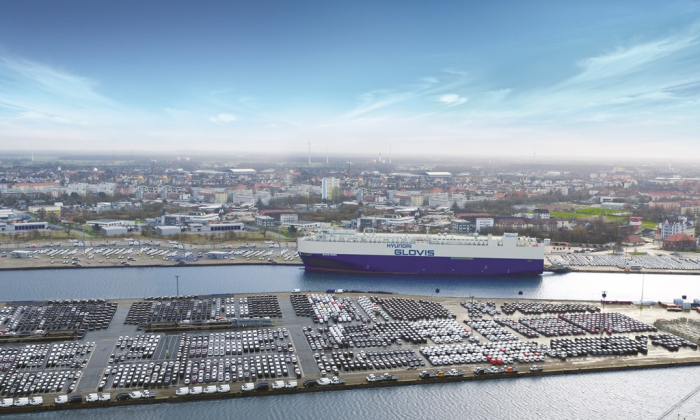Logistics
Hyundai Glovis to raise car shipping rates amid vehicle carrier shortage
The hike in shipping rates is expected to boost the logistics firm’s profitability as car transport demand rises post-pandemic
By Sep 04, 2023 (Gmt+09:00)
2
Min read
Most Read
LG Chem to sell water filter business to Glenwood PE for $692 million


Kyobo Life poised to buy Japan’s SBI Group-owned savings bank


KT&G eyes overseas M&A after rejecting activist fund's offer


StockX in merger talks with Naver’s online reseller Kream


Mirae Asset to be named Korea Post’s core real estate fund operator



Hyundai Glovis Co., the logistics unit of South Korea’s Hyundai Motor Group, plans to raise vehicle shipping rates considering the sharp rise in fees it must pay to borrow vehicle transport carriers amid a shortage of such ships.
At a recent meeting between the Hyundai Glovis chief executive and analysts, the company said it would raise seaborne freight rates for global automakers as early as October. It didn’t disclose the exact size of the planned fare increases, citing confidentiality agreements with its clients.
Freight rates for the company’s pure car and truck carriers (PCTCs) operating from Korea to overseas destinations will also be hiked from Jan. 1 next year, company officials said.
In addition to new shipping contracts, Hyundai Glovis plans to raise shipping rates applied to existing long-term contracts.
The company handles vehicles made by Hyundai Motor Group’s two automaking units – Hyundai Motor Co. and Kia Corp. – for overseas shipments.
Hyundai Glovis also counts Volkswagen AG and other global carmakers among its clients.

SOARING VESSEL BORROWING COSTS
According to market tracker Clarksons Research, the daily rental fee for a 6,500-CEU vehicle transport vessel averaged $110,000 in the second quarter, nearly double the $59,167 price seen in the year-earlier period.
CEU, which stands for car equivalent unit, is used to measure the capacity of vehicles or car carriers. A CEU is generally based on the dimensions of a 1966 Toyota Corona RT43, which is 4125 mm x 1550 mm x 1400 mm.
Despite the overall slowdown in the global shipping industry, demand for PCTC ships has grown due to cross-border electric vehicle transportation.
Following the COVID-19 pandemic, car exports have quickly returned to normal, resulting in a substantial increase in maritime traffic, which caused a shortage of PCTC vessels, industry officials said.
The planned hike in PCTC shipping costs is expected to improve Hyundai Glovis’ profitability, officials said.

TO EXPAND FLEET OF SHIPS
To meet rising demand, the company plans to expand its fleet of ships.
Last month, industry sources said Hyundai Glovis, which currently operates 72 PCTCs, will borrow at least 10 more such ships over the next two years.
It will put six PCTC ships into operation next year and is in talks to lease four more by the end of 2025, sources said.
The ships Hyundai Glovis plans to secure can carry up to 80,000 vehicles per vessel. All of those ships are eco-friendly vessels, run by an LNG dual-fuel engine, they said.
Separately, the company plans to place orders with shipbuilders to build more PCTC vessels.
Write to Hyung-Kyu Kim and Sungsu Bae at khk@hankyung.com
In-Soo Nam edited this article.
More to Read
-
 LogisticsHyundai Glovis to secure additional 12 car transport vessels by 2025
LogisticsHyundai Glovis to secure additional 12 car transport vessels by 2025Aug 09, 2023 (Gmt+09:00)
1 Min read -
 LogisticsHyundai Glovis, Malaysia’s Lion Group to enter ASEAN logistics market
LogisticsHyundai Glovis, Malaysia’s Lion Group to enter ASEAN logistics marketNov 16, 2022 (Gmt+09:00)
1 Min read -
 LogisticsHyundai Glovis signs $796 million shipping deal with global automaker
LogisticsHyundai Glovis signs $796 million shipping deal with global automakerNov 11, 2022 (Gmt+09:00)
1 Min read -
 Hydrogen economyHyundai Glovis launches ECOH brand for hydrogen, battery businesses
Hydrogen economyHyundai Glovis launches ECOH brand for hydrogen, battery businessesOct 04, 2021 (Gmt+09:00)
2 Min read -
 LogisticsHyundai Glovis, Ulsan Port Authority to build logistics center in Ho Chi Minh City
LogisticsHyundai Glovis, Ulsan Port Authority to build logistics center in Ho Chi Minh CityJan 14, 2021 (Gmt+09:00)
1 Min read
Comment 0
LOG IN


